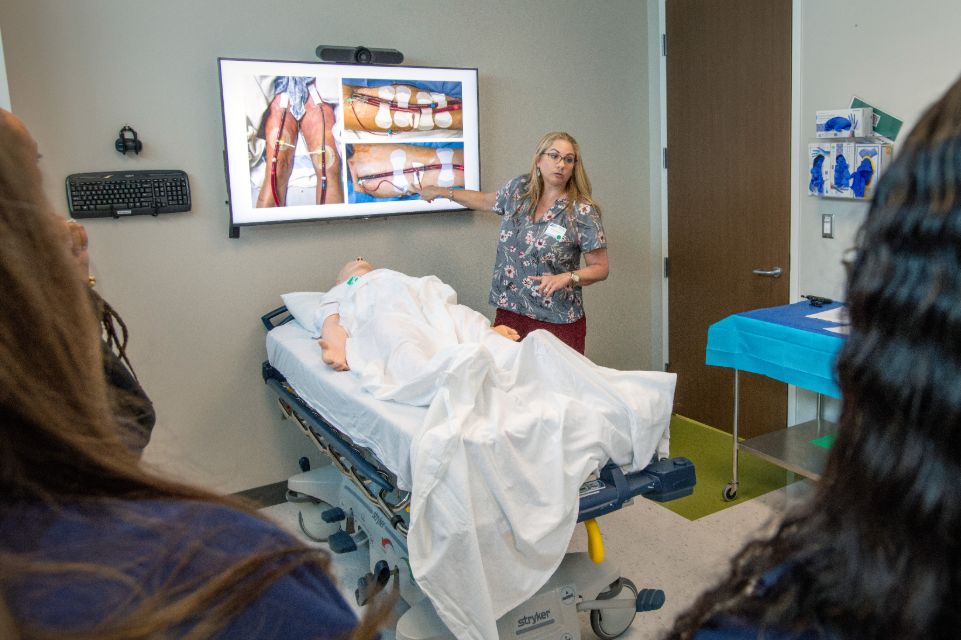Tampa General Hospital and USF Health Center for Advanced Medical Learning and Simulation Recognized as a Simulation and Education Program to Know
Published: May 8, 2025
Becker’s Hospital Review has recognized the academic health system for the second consecutive year for providing industry-leading, innovative health care training.
Tampa, FL (May 8, 2025) – Tampa General Hospital (TGH) has been recognized by Becker’s Hospital Review as having one of the nation’s Simulation and Education Programs to Know for 2024, in partnership with the USF Health Morsani College of Medicine Center for Advanced Medical Learning and Simulation (CAMLS). This honor reflects Tampa General and USF Health CAMLS’ use of innovative, state-of-the-art technology and realistic simulation scenarios to train students and health care professionals effectively and ultimately improve safety, cost effectiveness and patient outcomes.
Leveraging USF Health CAMLS, Tampa General trains nurses, physicians and support staff – as well as the future healthcare workforce – on various evidence-based clinical best practices, including for neonatal resuscitation and newborn care, stroke recognition and intervention, minimally invasive surgery, extracorporeal membrane oxygenation (ECMO), advanced trauma care, women’s health, central line training, foley catheter insertion and removal, Code Blue protocols and more.
“The simulation programs we’ve developed with USF Health CAMLS are a testament to the transformative potential of academic partnerships on our system and by extension, our community,” said John Couris, president and CEO of Tampa General. “They provide truly exceptional training opportunities, not just simulating real-world scenarios, but cultivating a new generation of highly skilled health care professionals and fostering a culture of continuous striving for a higher standard of care delivered every day.”
USF Health CAMLS was established in 2012 and encompasses 90,000 square feet and three stories in downtown Tampa, providing advanced simulation for health care professionals and students, including USF Health’s medicine, nursing, and pharmacy students. The facility is led by Dr. Haru Okuda, CEO and executive director of USF Health CAMLS, professor and Vice Chair of Academic Affairs in the Department of Emergency Medicine at the USF Health Morsani College of Medicine, associate vice president of interprofessional education, one of the foremost emergency physicians in the field, having written the definitive textbook for the oral board examination in emergency medicine, as well as having built the simulation centers for the New York Public Health System and the U.S. Department of Veteran Affairs.
"When I was a practicing emergency physician over 20 years ago, I experienced first-hand the limitations of traditional medical training,” said Okuda. “I realized the immense potential of simulation-based education to revolutionize how we prepare our health care workforce and improve patient safety. This recognition of USF Health CAMLS for our collaborative work with Tampa General is a source of great pride as this partnership underscores our shared belief that simulation is not merely a valuable adjunct to training but a fundamental component of building a highly skilled and adaptable health care system.”
Annually, USF Health CAMLS hosts over 30,000 clinicians and learners per year which support many of Tampa General’s doctors, nurses, allied health staff. This includes training for over 100 incoming medical residents each year in central line placement, ensuring the incoming cohort of interns are proficient and confident in performing health care skills.
“We're incredibly proud to lead the region in academic health care and to train the next generation of providers,” said Charles J. Lockwood, MD, MHCM, executive vice president of USF Health, dean of the USF Health Morsani College of Medicine, and chief academic officer at Tampa General. “Innovation is a core pillar of our work at both USF Health and Tampa General, as we recognize that medicine and patient care spaces are constantly evolving. Our training program is designed to anticipate and meet those advancements head-on to strengthen our team systemwide and create optimal patient outcomes.”
Tampa General, in partnership with USF Health CAMLS, is at the forefront of simulation education, leveraging immersive technologies like virtual and augmented reality to create highly realistic training environments. These extended reality applications are being used to simulate various hospital settings, from operating rooms to patient rooms, with a focus on enhancing team communication and critical thinking skills. Furthermore, researchers at CAMLS are integrating advanced haptic technology into virtual reality training scenarios, utilizing specialized gloves that simulate the tactile sensations of medical procedures to enhance realism and skill acquisition.
At the end of last year, with TGH’s support, USF Health CAMLS rolled out an advanced mobile simulation unit as part of its program “CAMLS Without Walls.” Using a decommissioned ambulance equipped with high-tech manikins and equipment, the program provides immersive, hands-on training to students and medical professionals in underserved and rural communities who normally wouldn’t be able to travel to the USF Health CAMLS facility for training. Earlier this year, the National Institutes of Health (NIH) awarded a Phase 2 Small Business Innovation Research (SBIR) grant to USF Health CAMLS and Immertec for a collaborative research initiative aiming to evaluate the viability and effectiveness of immersive technology in providing specialized medical training to rural health care professionals.
Becker’s Hospital Review is a leading source of business news for the health care industry. The full list of Becker’s 2024 Simulation and Education Programs to Know can be found here.
